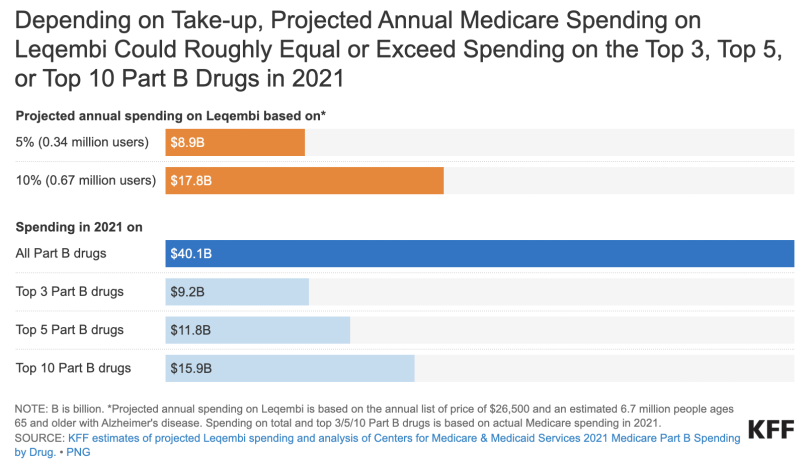CNBC.com reports that Senate HELP committee chair, Bernie Sanders, is blasting drug manufacturers Eisai and Biogen for setting the price of its Alzheimer’s drug at a level that will prevent people with Medicare from being able to get it. He wants the US Department of Health and Human Services to lower the price of Leqembi down from its “unconscionable” current price of $26,500 a year.
Like Aduhelm, Leqembi is a prescription drug administered by a physician and therefore covered under Medicare Part B. Medicare covers 80 percent of the cost, and individuals must pay 20 percent coinsurance. People’s annual out-of-pocket costs for Leqembi alone would be more than $5,000, unless they have Medicare supplemental coverage.
Right now, the price of Leqembi will drive up Medicare spending significantly, along with Medicare Part B premiums. It will also contribute to the erosion of the Medicare Trust Fund. Medicare will be spending more than it spent on the three most costliest Part B drugs in 2021. And, though the government has the right to negotiate drug prices for the Part B and D drugs it spends the most on, it will not be able to negotiate the price of Leqembi for 13 years, given restrictions on drug price negotiation in the Inflation Reduction Act.
As I wrote earlier this year when the FDA approved Leqembi, “Keep in mind that after the FDA approved Aduhelm, the government adjusted the Medicare Part B premium up $11 a month! Its list price was $56,000 a year, and the government assumed hundreds of thousands of people would take it.” (Thankfully, Medicare did not end up covering Aduhelm because of health risks associated with taking it and only minor benefits at best.) “This year, the standard Part B monthly premium is down $5.20 because the government adjusted it to account for the fact that Medicare is not covering Aduhelm.”
Sanders wants manufacturers to voluntarily reduce Leqembi’s price. If not, he wants the US Department of Health and Human Services to use its authority to break the drug’s patent in order to drive competition in the market. Sanders also suggests that the Centers for Medicare and Medicaid Services (CMS) has the authority to pay less for Leqembi. It is possible, though not likely, that a similar Eli Lilly drug, donanemab, that has not yet gone to market will help drive down Leqembi’s price.
How many people with Medicare would get Leqembi? We don’t yet know how many people with Medicare will take Leqembi. Medicare is covering it for “patients with mild cognitive impairment or mild dementia with confirmed amyloid plaques,” which could be a large cohort of the 6.7 million people with Alzheimer’s disease. The Kaiser Family Foundation estimates that if one in 20 people with Medicare take it, it would cost the Medicare Part B Trust Fund $8.9 billion annually.
About half of people with Medicare have an annual income under $30,000. They would be hard-pressed to afford coinsurance of more than $5,000. Even if they have Medicare supplemental coverage to pick up the coinsurance, the cost of their supplemental coverage is likely to rise significantly, given the cost of Leqembi and the number of people with Medicare who might take it.
What is the fair price for Leqembi? The Institute for Clinical and Economic Review suggests that the fair price for Leqembi could be as low as $8,900 a year. Even at that price, it would mean nearly $1,800 a year in out-of-pocket costs for people taking it.
Here’s more from Just Care:










